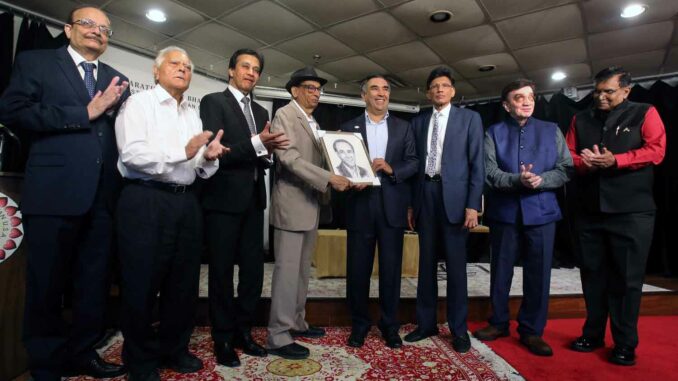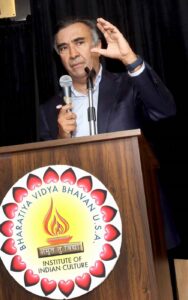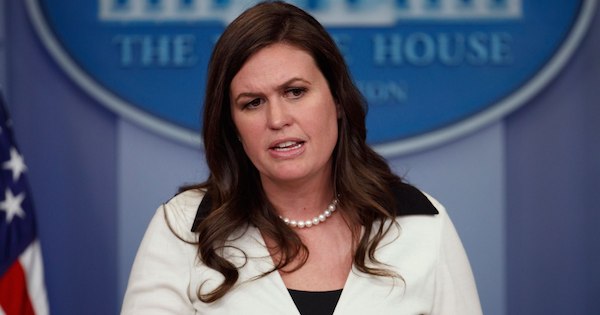
By Priyanka Khanna
NEW YORK (TIP): Medicine and teaching are both referred to as noble professions. But a mental health professional or a clinician or a teacher in a remote and nondescript part of expansive countries like India or Nigeria may often find themselves alone, possibly defeated, when faced with a challenge of saving a life or shaping a mind.

That is where Project ECHO®, which was created to meet the needs of New Mexico, US, but is today tackling some of the world’s greatest challenges, comes in. By making knowledge accessible at the right time in more than 9,000 cities and 180 countries, Project ECHO is on track to meet the goal of touching a billion lives by 2025. Dr. Sanjeev Arora, a hepatologist at the University of New Mexico in Albuquerque who founded Project ECHO over 20 years ago, says: “ECHO helps clinicians, mental health professionals and now even educators to do justice to their chosen profession.” “All teach, all learn” is the approach of this tele-mentoring model that is enabling knowledge-sharing in rural and underserved communities around the world. “We started in the medical field, but we now find that this tele-mentoring model is enhancing knowledge and developing professionals to solve a range of major problems in the society, including climate change,” he adds. Dr. Arora was speaking at the Bharatiya Vidya Bhavan in in New York recently and sat down with our reporter for an interview after the event. Elaborating on the genesis of Project ECHO, he detailed how his mission began when he found out that his patient, a 43-year-old widow and mother of two, knew she was infected with the life-threatening hepatitis C but did not seek treatment for eight years.
When questioned why she delayed treatment, she said she could not afford to take the time off of work to make the five-hour trip to Albuquerque, the only and nearest clinic that offered treatment for hepatitis C. Also, she was a single mom with two children to care for. She finally sought help when her abdominal pain became unbearable.
But it was too late. Hepatitis C had caused advanced liver cancer that was not suited for surgery or liver transplantation. She died six months later. “I asked myself, why did this mother have to die? The medicine and expertise needed to treat this patient’s illness were available. But she died because the doctor in her community did not have the expertise required to treat her disease.”
This mother’s story was one of many Dr. Arora witnessed in his Albuquerque clinic. At the time, there were 28,000 patients with hepatitis C in New Mexico and only 1,500 had been treated. People were dying of a treatable and curable disease because they could not access timely treatment. He decided to take action. First, he sent out his protocol for treating hepatitis C to primary care physicians across the state. But he soon realized that simply providing the right information was not enough. To master the complexity of treating hepatitis C, providers needed something more. Dr. Arora recruited primary care clinicians throughout the state to create a virtual “community of practice” or a space where doctors could learn from experts and each other; where they could discuss real-life case examples that offered insight on New Mexico’s unique patients and systems. In one year, these clinicians became experts in the treatment of hepatitis C – the first success story of the global organization now known as “Project ECHO.”
In 2011, a rigorous evaluation published in the New England Journal of Medicine showed that the care delivered to hepatitis C patients by ECHO-trained providers was equal to that of University of New Mexico specialists. This cemented Dr. Arora’s belief that large scale change is possible. The ECHO Model does not just apply to improving hepatitis C treatment. Today, it is being used in the field of clinical and mental health, education and even climate change. Most recently, the model was put to test during the COVID-19 pandemic and applied in the field of mental health in India. In partnership with India’s National Institute of Mental Health and Neurosciences (NIMHANS), the ECHO Model was used to train frontline healthcare workers to identify and support mental illnesses.
“COVID-19 and associated lockdowns caused a severe shortage of psychiatrists and an increase in issues like domestic abuse, insomnia and anxiety across India,” says Dr. Arora. “Our partnership with NIMHANS led to 29X increase in patients – more than 50% of whom were women – accessing mental health treatment. If note for the ECHO-enabled trainings, 90% of the cases being treated would have remained undiagnosed or untreated,” he adds.
In fact, the ECHO Project has the most numbers of “ECHO Hubs” among all the 180 countries that it is operating from globally. Beginning its India operations in 2008, Project ECHO has grown to over 130 ECHO Hubs, offering over 250 programs and reaching over 525,000 people as of March 2022. In fact, India is home to 25 percent of all ECHO Hubs in the world. No other country has these many ECHO Hubs.
It is not surprising then that Project ECHO has received glowing reviews from Indian health authorities. ECHO Project quoted Dr. Rathi Balachandran, Assistant Director General, Ministry of Health and Family Welfare, Government of India, as saying: “The project of building the capacity of nurses through the ECHO Model was a great success and the sessions transformed the nurses from confused team members to confident leaders in terms of managing COVID-19 cases.” Similarly, Dr. Soumya Swaminathan, Chief Scientist at WHO, reportedly said: “I am delighted to see that Project ECHO India has really taken off. I recognize that it has a huge potential in a country like India. We know how many issues arise when you’re sitting in a remote district somewhere and you have a difficult-to-manage patient condition; this type of platform really helps.” Speaking about future plans, Dr. Arora said that he is hopeful of finding support from among the Indian diaspora to continue their work towards empowering people in India to make a difference in their communities with the right knowledge, at the right time.
(The author can be reached at priyanka@gmail.com)





Be the first to comment